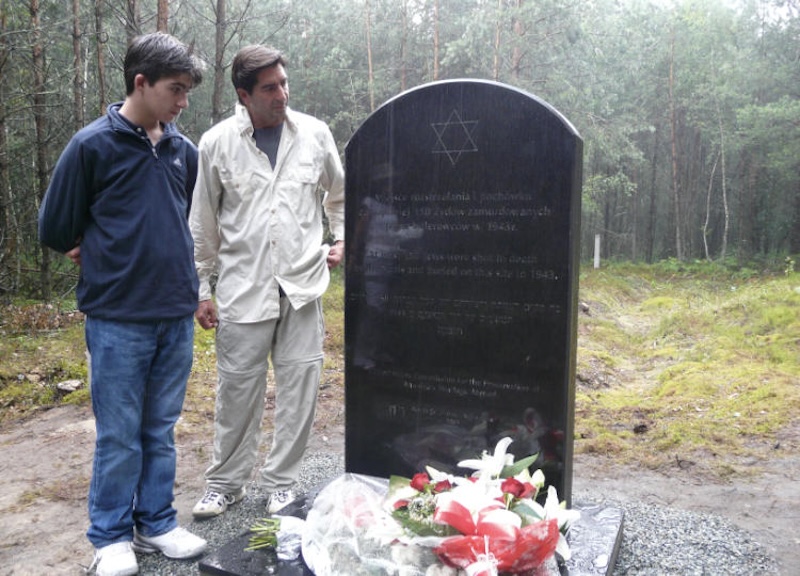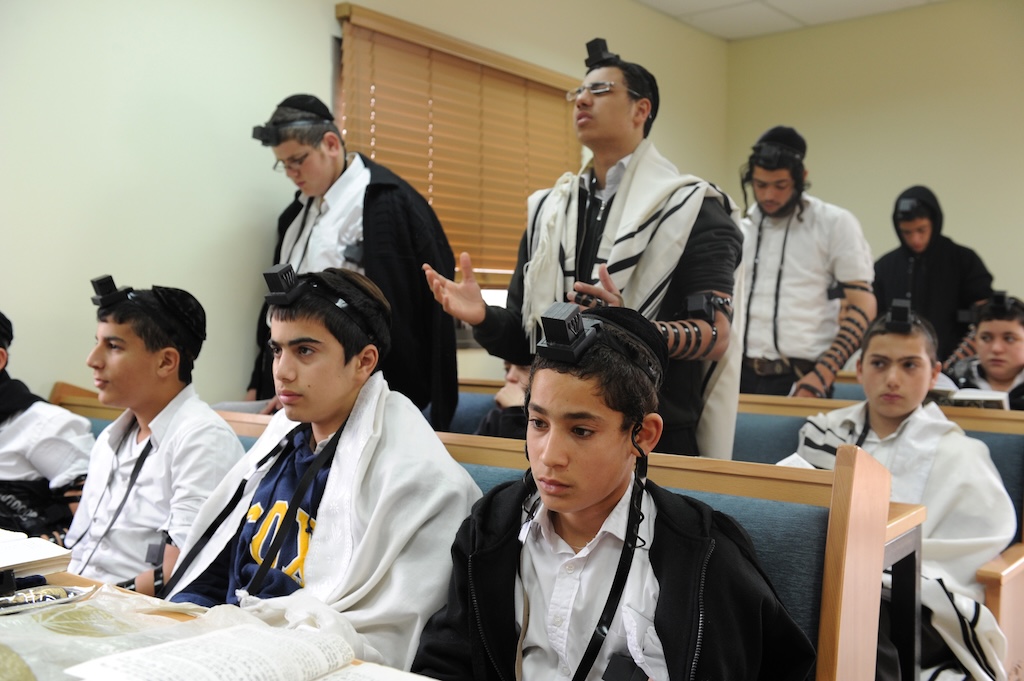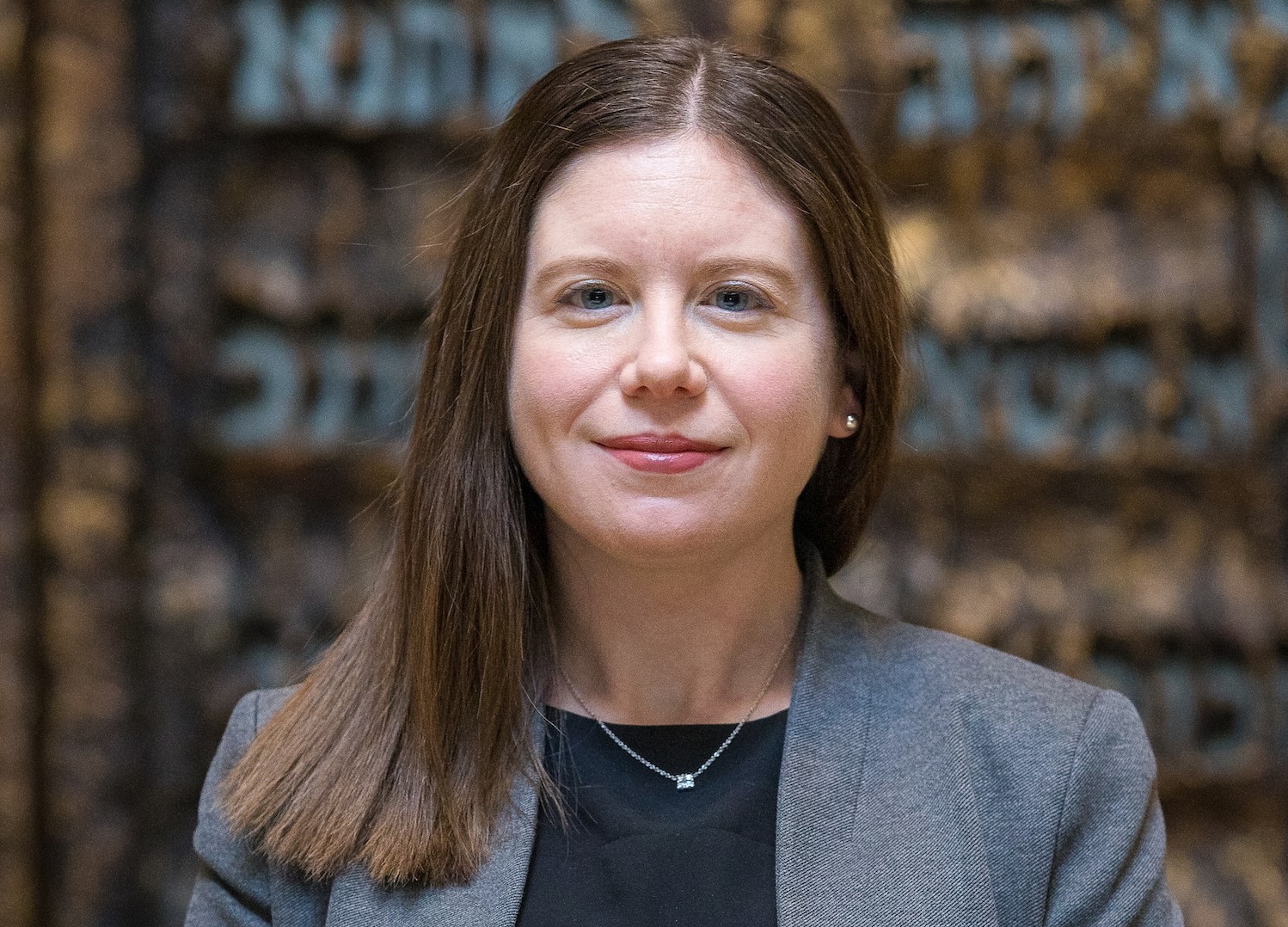Your Daily Phil: With ‘nonprofit bill,’ growing needs, Israeli civil society feels the squeeze
Good Monday morning.
In today’s edition of Your Daily Phil, we report on the mounting pressures facing Israeli civil society. We interview philanthropist Harley Lippman about his efforts to memorialize the Jews killed in early Nazi massacres and report on the National Education Association executive committee’s decision to reject a resolution barring the teachers’ union from using Anti-Defamation League resources. We feature an opinion piece by Michael Berenbaum and Menachem Z. Rosensaft responding to a prominent Holocaust scholar’s assertion that Israel is commiting genocide in Gaza, and one by Dar Nadler about a program equipping young Haredim in Israel with both Torah knowledge and vocational training. Also in this issue: Laura Ben-David, Yiscah Smith and Todd Polikoff.
What We’re Watching
Reut USA and The Rabbi Sacks Legacy’s daylong conference, “The Great Diaspora: Visioning American Jewry at America’s 250th – Inspired by Rabbi Sacks zt”l,” kicks off today in New York. If you’re there, say hi to Jewish Insider’s Haley Cohen.
The Conference of Presidents of Major American Jewish Organizations launches a three-day mission to Israel today.
What You Should Know
A QUICK WORD WITH EJP’S JUDAH ARI GROSS
Israeli civil society is feeling the squeeze. On one side, the state budget for social services is being cut back or remaining stagnant to pay for the costs of the ongoing fighting in Gaza and recent conflicts with Iran and Hezbollah, even as welfare needs grow as a result of the wars, putting more of the welfare onus on the country’s nonprofits. On the other, the governing coalition today continued its efforts to pass its so-called “nonprofits bill,” a controversial piece of legislation that would impose a heavy tax on foreign government donations to Israeli NGOs, making it harder for those organizations to raise money to address those greater needs.
And this comes as Prime Minister Benjamin Netanyahu and other government ministers have taken aim at one of the main conduits through which tens of millions of dollars flow from American donors to Israeli nonprofits each year (hundreds of millions in the immediate aftermath of the Oct. 7 attacks): PEF Israel Endowments, a self-described “clearinghouse” for American donations to Israel.
During a stormy session of the Knesset’s Constitution and Law Committee earlier today, parliamentarians debated the latest version of the contentious nonprofits bill, which its proponents see as necessary to prevent foreign government intervention in internal Israeli affairs and which opponents see as an effort to stifle criticism. The original version of the measure would have imposed an 80% tax on all foreign government donations to an Israeli nonprofit unless it received an exemption from the finance minister. The revised bill lowers the tax rate to 23% — the same as foreign investment for a business — and replaces the ministerial exemption with one based on more definitive guidelines, including a pledge by the nonprofit to refrain from criticizing government policies and to refrain from all political activities, such as lobbying in the Knesset.
For critics of the bill, these alterations are wholly insufficient. “Yes, 23% is not 80%, but from what I hear, the nonprofits who receive funding from foreign governments understand that countries would not make donations because they don’t want to give money directly to the Israeli government [through the taxes],” Amir Fuchs, a senior researcher at the Israel Democracy Institute, told eJP. “If you’re an organization that helps Holocaust survivors and there’s a discussion in the Knesset about Holocaust survivors, of course you would want to send someone to the discussion, but that is forbidden.”
Shimon Siani, chair of the civil society umbrella group Manhigut Ezrachit (Civil Leadership) and executive director of the at-risk youth nonprofit Yedidim, told eJP that while he understood the intentions of the bill’s sponsors, the legislation would be a bureaucratic burden for already-struggling nonprofits. It would also paint all NGOs as inherently suspicious, forcing them to pledge that they are not trying to overturn the government. “I don’t want to have to declare that I’m not a criminal because I’m not a criminal. If there’s someone who’s suspicious, investigate him,” Siani said.
During a stormy session of the Knesset’s Constitution and Law Committee earlier today, parliamentarians debated the latest version of the contentious nonprofits bill, which its proponents see as necessary to prevent foreign government intervention in internal Israeli affairs and which opponents see as an effort to stifle criticism. The original version of the measure would have imposed an 80% tax on all foreign government donations to an Israeli nonprofit unless it received an exemption from the finance minister. The revised bill lowers the tax rate to 23% — the same as foreign investment for a business — and replaces the ministerial exemption with one based on more definitive guidelines, including a pledge by the nonprofit to refrain from criticizing government policies and to refrain from all political activities, such as lobbying in the Knesset.
For critics of the bill, these alterations are wholly insufficient. “Yes, 23% is not 80%, but from what I hear, the nonprofits who receive funding from foreign governments understand that countries would not make donations because they don’t want to give money directly to the Israeli government [through the taxes],” Amir Fuchs, a senior researcher at the Israel Democracy Institute, told eJP. “If you’re an organization that helps Holocaust survivors and there’s a discussion in the Knesset about Holocaust survivors, of course you would want to send someone to the discussion, but that is forbidden.”
Shimon Siani, chair of the civil society umbrella group Manhigut Ezrachit (Civil Leadership) and executive director of the at-risk youth nonprofit Yedidim, told eJP that while he understood the intentions of the bill’s sponsors, the legislation would be a bureaucratic burden for already-struggling nonprofits. It would also paint all NGOs as inherently suspicious, forcing them to pledge that they are not trying to overturn the government. “I don’t want to have to declare that I’m not a criminal because I’m not a criminal. If there’s someone who’s suspicious, investigate him,” Siani said.
Shimon Siani, chair of the civil society umbrella group Manhigut Ezrachit (Civil Leadership) and executive director of the at-risk youth nonprofit Yedidim, told eJP that while he understood the intentions of the bill’s sponsors, the legislation would be a bureaucratic burden for already-struggling nonprofits. It would also paint all NGOs as inherently suspicious, forcing them to pledge that they are not trying to overturn the government. “I don’t want to have to declare that I’m not a criminal because I’m not a criminal. If there’s someone who’s suspicious, investigate him,” Siani said.
Though the bill only affects donations from foreign governments, the legislation has many private Jewish funders alarmed. Sir Mick Davis, a former chair of the British Conservative Party, who organized a letter earlier this year to Israeli Foreign Minister Gideon Sa’ar against the bill, told eJP at the time that the concerns are two-fold: One, that it is anti-democratic by allowing the government to impose taxes on opponents and provide relief to supporters, and two, that it represents an “assault on the philanthropic endeavours of Diaspora Jews,” by harming nonprofits that received “seed funding from Diaspora Jewish philanthropists.”
Fuchs, who has written about the bill for IDI, stressed that even this updated version of the bill will not be the final version, but is instead a starting point, particularly as the Knesset now has its summer recess. “They’ll start exempting groups,” he said, such as groups focused on education or those that benefit Holocaust survivors or address poverty things. Ultimately, Fuchs said, the law would only apply to “problematic groups” like human rights NGOs, LGBTQ groups and women’s groups.
Fundamentally, Fuchs said, the bill is about expanding government power, ensuring that nonprofits stay in line or face “a financial blow.” “The environmental groups will exist but they won’t criticize the government,” he said. “Then the government can use them.”
Alongside the government’s legislative effort against foreign-government funding for Israeli nonprofits, the premier has ramped up an Israeli public opinion campaign on the subject in recent days. On Friday, Netanyahu posted on social media a graphic from a memo drafted by two House Republicans, Rep. Jim Jordan of Ohio and Rep. Brian Mast of Florida, alleging — based on nigh nonexistent evidence — that the American government provided funding to Israeli civil society organizations that opposed the government’s judicial overhaul plan in 2023.
In his post, Netanyahu included a false claim that the memo found that the Biden administration provided “nearly a billion dollars to left-wing nonprofits in Israel.” No such allegation appears in the memo, as many have pointed out to the Prime Minister’s Office — including this reporter. Yet this has since been repeated by other Likud ministers and by supporters of the government.
At most, the memo alleges that $187,000 of federal funds could have gone to Israeli civil society organizations — but even this is entirely speculative and also hinges on a profound misunderstanding of how donor-advised funds operate. Rockefeller Philanthropy Advisors, a DAF that has in the past received federal grants, transferred $187,000 from 2021 to 2024 to PEF Israel Endowments, which has made donations to the Israeli nonprofits in question. Critically, there is neither evidence that the funds transferred from RPA to PEF came from federal grants, nor is there evidence that the funds transferred from RPA to PEF went to those specific Israeli nonprofits; several of the Israeli groups have also flatly denied receiving U.S. government funds.
For PEF, its involvement in the campaign is primarily baffling, as the organization does not have a particular ideological bent, transferring funds from Americans to a wide array of Israeli nonprofits, including many on the political right and ones that operate in West Bank settlements.
“Why would anyone who supports Israel denigrate and defame PEF?” the group’s president, Geoffrey Stern, told eJP in a message, adding a “shrug” emoji.
K’VOD HAMET
How a bar mitzvah project led to an ongoing effort to find, commemorate mass graves from the Holocaust

For the better part of 16 years, Harley Lippman — a Jewish philanthropist and grand marshal of this year’s Israel Day on Fifth parade in New York — has enlisted and funded a team in Poland to research, locate and memorialize those killed in the Nazi massacres that preceded the 1941 launch of the “Final Solution,” reports eJewishPhilanthropy’s Nira Dayanim.
Mitzvah project: According to Lippman, the initiative started with a bar mitzvah project. For his oldest child, the family funded an orphanage in Cambodia. For the second child, they restored a Torah and donated it to the Jewish community of Poland — in the process, Lippman recalled, developing a relationship with Michael Schudrich, Poland’s chief rabbi. When the bar mitzvah of Lippman’s youngest child came around, Schudrich introduced them to the history of the unmarked mass graves. “As wonderful as a party is, we wanted to put meaning into it,” he told eJewishPhilanthropy recently. “Working with [Schudrich], we learned that there is an aspect to the Holocaust that is largely unknown.”
REVERSING COURSE
National Education Association rejects ADL boycott proposal

The National Education Association, the largest teachers’ union in the country, announced on Friday that it would not cut ties with the Anti-Defamation League, declining to implement a contentious resolution approved by its governing body earlier this month that sought to target the Jewish civil rights organization, reports Gabby Deutch for eJewishPhilanthropy’s sister publication Jewish Insider.
What is said: “After consideration, it was determined that this proposal would not further NEA’s commitment to academic freedom, our membership or our goals,” the union’s board of directors said in a statement. The decision came nearly two weeks after the measure was adopted by the NEA’s representative assembly, its annual leadership gathering that drew more than 6,000 union delegates. “There is no doubt that antisemitism is on the rise. Without equivocation, NEA stands strongly against antisemitism. We always have and we always will,” the NEA’s board wrote. “In this time of division, fighting antisemitism, anti-Arab racism, and other forms of discrimination will take more resources, not fewer. We are ready.”
Read the full story here and sign up for Jewish Insider’s Daily Kickoff here.
LET’S BE CLEAR
It is not genocide: A response to Omer Bartov

“Omer Bartov is a respected historian of the Holocaust who also teaches about genocide as Dean’s Professor of Holocaust and Genocide Studies at Brown University. We do not impugn his scholarship regarding Nazi Germany’s annihilation of 6 million Jews during World War II, but we substantively disagree with the conclusions stated in his July 15 op-ed in The New York Times, ‘I am a Genocide Scholar. I Know It When I See It,’” write Michael Berenbaum, director of the Sigi Ziering Institute at American Jewish University in Los Angeles, and Menachem Z. Rosensaft, who teaches about genocide law at Cornell and Columbia University’s law schools, in an opinion piece for eJewishPhilanthropy.
Intent and responsibility: “We are not arguing that this war has always been waged appropriately or that it has been waged proportionally. Nor do we suggest that Israel or any other country involved in warfare cannot be accused of or should not be held accountable for other alleged violations of international law, including crimes against humanity, war crimes and even ethnic cleansing. But those are separate questions from whether a genocide is being committed; and unless such alleged violations of international law satisfy the elements, including specific intent, as defined in Article II of the [Genocide] Convention, they do not constitute genocide. Bartov acknowledges ‘it is crucial to be able to distinguish the attempt to destroy a particular group of people from other crimes under international law’ … Unfortunately, he fails to draw any such distinction. He also refuses to engage in the requisite nuance by not holding Hamas and other Palestinian terrorist groups responsible in any way for the carnage.”
NEW PATHWAYS
How a network of sci-tech schools in Israel offers a model for Haredi integration

“The national and social imperative to integrate Haredim is one of the most important and sensitive challenges that Israel is facing today. As a rapidly growing population, their inclusion is not only an economic necessity but also a critical step toward fostering social cohesion and ensuring a fairer distribution of societal burden,” writes Dar Nadler, executive director of Friends of Israel Sci-Tech Schools, in an opinion piece for eJewishPhilanthropy. “The ISTS network has built trust with Haredi communities through a quiet, consistent and respectful approach over time. Its central message is that maintaining a Haredi lifestyle is fully compatible with employment and public engagement, one does not have to come at the expense of the other.”
A community-focused model: “ISTS isn’t an attempt to pull Haredi students away from their communities — it’s an effective way to empower them. The community-focused model ensures that graduates return to their communities equipped with both spiritual depth and practical skills… As Israeli society grapples with existential questions about national service and social cohesion, the work of ISTS offers a clear message: solutions are already here. They just need support, goodwill and scaling.”
Worthy Reads
Coming Apart at the Seams: In The New York Times, Ezra Klein describes the emerging rift in American Jewish politics. “For Jews of the diaspora, multiethnic democracy — in which the rights and security of political minorities are protected — is the bedrock on which our safety is built. For Jews of Israel, a Jewish majority is the bedrock upon which their state is built. … I’ve watched the experience of rising antisemitism polarize young Jews into two camps. Some have moved closer to Israel, convinced that their elders were right and their standing in the West was more tenuous than they had believed. Some have moved into a deeper alienation, horrified at what is being done in their name and angry at the way their safety has felt compromised by the actions and politics of a state in which they do not live.” [NYTimes]
Lesson From Laura: In The Times of Israel, Shoshanna Keats Jaskoll remembers her friend, photographer, writer and activist Laura Ben-David, who died of cancer last week at 56. “There is too much I can say about Laura and it is impossible and cruel to distill a person into five minutes — but if I have to give over the legacy that is Laura, it would be that she was ‘all in.’ She was ‘all in’ in everything she did. Yes, through her work, her photography and her writing. But most importantly as someone who loves fiercely and unconditionally… I’m telling you this because you have a choice. You can choose to love — and love fiercely. To support the people around you. To help them fulfill their dreams — to make their dreams your dreams — and their success your success. You can choose to be ‘all in.’… She was all in for her kids. She was all in for Israel. She was all in for the Jewish people. Whatever she had, she gave — with a full heart.” [TOI]
Fighting Fair: In his Substack “Moneyball Judaism,” Rabbi Joshua Rabin observes that pushing for a blanket state of “Jewish unity” can, in practice, be an exclusionary process that defines “who’s in and who’s out of acceptable discourse”; instead, he writes, let’s fight, but with ground rules. “The disagreements we face are not trivial. Hamas has still not released all the hostages, and the path to bringing them home is morally urgent and deeply complicated. Antisemitism is on the rise, and the reasons are hard to diagnose but essential to track. And those are just the emergencies — everyday Jewish life is full of debates about issues that are important but not emergencies. To call for unity risks trivializing the stakes of those disagreements. Instead, I want to propose a more grounded aspiration. Let’s start by fighting fairly, guided by (at least) two principles… We’re living through intense power struggles around Israel, antisemitism, communal funding, political allegiances, and more. Sometimes, we lose those battles. Sometimes, the people we disagree with end up in positions of power. And when that happens, it’s easy to feel not just disappointed, but vengeful. Don’t take the bait. Your fellow Jew is not your enemy, and treating them like one only deepens the harm we’re trying to repair.” [MoneyballJudaism]
Cowed on Campus: In Tablet, Eric Kaufmann looks at recent survey data from the Foundation for Individual Rights and Expression that indicates shifts in the behaviors of Jewish college students as campus climates become increasingly politicized in the wake of the Oct. 7, 2023, Hamas attacks and ensuing war in Gaza. “A closer look at the 2024 data shows that the pro-Palestinian tent encampments had a big impact: Before they went up on April 17, 28% of Ivy League Jewish students self-censored. Afterward, 40% did. Across all institutions in the FIRE data, statistical analysis shows that the encampments increased Jewish self-censorship while reducing it for conservatives. Conservative speech has for years been the least free of any major demographic, but Jews have now converged with them. In the Ivy League, Jews now self-censor more than conservatives do.” [Tablet]
Word on the Street
Harvard Business School graduate Yoav Segev filed a lawsuit against the university and its police department, alleging that both failed to protect him from being assaulted by anti-Israel campus activists and that school officials obstructed an investigation into the incident…
Likud minister May Golan is being investigated for allegedly misusing funds from her anti-migrant nonprofit “the Hebrew City”…
Wearing a dog tag symbolizing solidarity with the hostages in Gaza, Israeli-American poker champion Michael Mizrachi won his first World Series of Poker main event…
In an interview with Bloomberg, billionaire philanthropists John and Laura Arnold critiqued the Trump administration’s tax law for adding to the national deficit and the withdrawal of funding for research…
The Wall Street Journal spotlights the efforts of Robert Kraft’s Foundation to Combat Antisemitism, under the leadership of Adam Katz, to use analytics to identify digital trends in antisemitism, craft countermessaging and share data with social media platforms and universities…
Since the onset of the Israel-Hamas war, Israel-born lone soldiers have been faced with rising pressure and limited support, The Times of Israel reports…
Senior Christian leaders from Jerusalem, including Cardinal Pierbattista Pizzaballa, visited the sole Catholic church in Gaza, which was damaged by an Israeli strike last week that also killed three people…
Israeli Prime Minister Benjamin Netanyahu’s office resolved a dispute between U.S. Ambassador to Israel Mike Huckabee and Israeli Interior Minister Moshe Arbel over the denial of visas to workers and volunteers for several evangelical Christian organizations, two sources involved in the matter told Jewish Insider’s Lahav Harkov on Sunday…
The Times of Israel profiles Jewish educator Yiscah Smith on the occasion of her new book, Planting Seeds of the Divine…
Lawrence Summers has resigned from the advisory board of Bari Weiss’ University of Austin, citing his discomfort with the university’s direction…
The New York Times dives into debate surrounding the place of Israeli Prime Minister Benjamin Netanyahu on the Wall of Fame at his alma mater, Cheltenham High School…
In an opinion piece for Fast Company, philanthropist James Chen defines philanthropy as a mechanism to set social advocacy priorities, and its limitations in providing “government-scale aid”…
Philanthropist Lord Alliance, who was instrumental in the transport of Ethiopian Jews to Israel, died at 93…
Major Gifts
Los Angeles-based Haredi philanthropist Rabbi Berel Weiss donated $5 million to Jerusalem yeshivot that have lost state funding over students’ refusal to enlist in the military…
Transitions
Todd Polikoff has recently been named CEO of the Aaron Family Jewish Community Center in Dallas…
Pic of the Day

Family, friends and fellow soldiers attend the funeral today of Cpl. Dan Phillipson, a “lone soldier” from Norway, at Mount Herzl Military Cemetery in Jerusalem. Phillipson died from wounds sustained in an apparent suicide attempt at an IDF training base in southern Israel yesterday.
Birthdays

CEO of Women of Reform Judaism since 2023, Rabbi Liz P.G. Hirsch…
Laureate of the 1992 Nobel Prize in chemistry, Rudolph A. Marcus turns 102… President at Admar Group, Henry Dean Ostberg… Retired CEO of Sony/ATV, a large music publishing firm, he is a member of the Songwriters Hall of Fame, Martin Bandier… Professor emeritus in the Department of Physics at Bar-Ilan University, he won the Israel Prize in 2018, Shlomo Havlin… Director of the Center for the Political Future at USC, Robert Shrum… Criminal defense attorney, known for representing many politicians, celebrities and organized crime defendants, Benjamin Brafman… Former member of the U.K.’s House of Commons, now in the House of Lords, Baroness Susan Veronica Kramer… U.S. senator (R-WY), John Barrasso… Chairman and CEO at Quantitative Financial Strategies, Sanford “Sandy” Jay Grossman… Endocrinologist and professor at Columbia University’s medical school, she is an honorary president of New York City’s Central Synagogue, Shonni Joy Silverberg, MD… Professor at Columbia Law School and daughter of the late Justice Ruth Bader Ginsburg, Jane Carol Ginsburg… Executive director of the Jewish Labor Committee, Arieh Lebowitz… Brooklyn resident, Irene Ostrovsky… Comedian and actor, best known for his five seasons on “Saturday Night Live” ending in 1990, Jon Lovitz… Former chief rabbi of Moscow, his opposition to the Ukraine war forced him to leave Russia, Rabbi Pinchas Goldschmidt… Literary agent at the William Morris Endeavor book department, Eric Matthew Simonoff… Actress and producer, Alysia Reiner… Professor of astronomy at MIT and winner of a 2013 MacArthur genius award, Sara Seager… Brazilian fashion designer best known for avant-garde designs and eclectic prints, Alexandre Herchcovitch .. CEO of Fanatics, licensed sports merchandise and digital sports platform, Michael G. Rubin… Founder, president and CEO of Securing America’s Future Energy (SAFE) and the Electrification Coalition, Raphael “Robbie” Diamond… Rabbi of Congregation Bais Naftali in Los Angeles, his YouTube channel has over 4.6 million views, Rabbi Yoel Gold… Online media personality and director of product management at Electronic Arts in Vancouver, British Columbia, Veronica Belmont… Clinical social worker, Aniko Gomory-Pink… Entrepreneur and political activist, Chloé Simone Valdary… Policy advisor at Brownstein Hyatt Farber Schreck, Zachary A. Marshall… Recruiter at Tines, Rachel Elizabeth Nieves… Attorney in Madrid and secretary general of the Federation of Jewish Communities of Spain until 2021, Elias Cohen…









